Brian Clegg's Blog, page 8
January 14, 2025
Is biodiversity good for human wellbeing? - revisited
 REVISIT SERIES - An edited post from January 2015I was interested to see on the BBC News site that a link has been shown between biodiversity and human wellbeing. It seems widely accepted that exposure to the countryside is good for most people's wellbeing (though some can't stand it, and I wouldn't want to perpetrate a lazy stereotype), but biodiversity is a whole different kettle of fish. Nonetheless here's a direct quote of the subtitle of the piece on the BBC site:
REVISIT SERIES - An edited post from January 2015I was interested to see on the BBC News site that a link has been shown between biodiversity and human wellbeing. It seems widely accepted that exposure to the countryside is good for most people's wellbeing (though some can't stand it, and I wouldn't want to perpetrate a lazy stereotype), but biodiversity is a whole different kettle of fish. Nonetheless here's a direct quote of the subtitle of the piece on the BBC site:Scientists need to capitalise on a growing body of evidence showing a link between biodiversity and human wellbeing, a US review has suggested.
Now, there are several issues here. Luckily (and, sadly, still rarely), the original review paper Exploring connections among nature, biodiversity, ecosystem services, and human health and well-being: Opportunities to enhance health and biodiversity conservation (snappy title) is open source and you can read it here for free.
I have three issues:
What is wellbeing? I have reviewed several books on happiness (such as Happiness by Design and Happiness ) and they tend to make it clear that most studies miss significant aspects of what happiness is, and don't properly understand the nature of what makes us happy/gives us wellbeing. As far as I can see, in the review paper there is no attempt to qualify what was being measured as 'wellbeing', how effectiveness the measure was, and whether the studies were all measuring the same thing.The review paper doesn't describe a link between biodiversity and wellbeing. It shows links between being exposed to nature and wellbeing, and says that there may be health benefits from being exposed to biodiversity in bacteria. But it says nothing useful about whether, say, the number of newt species reducing from 15 to 14 (that isn't a fact, it's just to give a feel for what reducing biodiversity means) has any effect on wellbeing. My suspicion is that it doesn't - that the benefit (leaving aside the bacterial aspect) is purely from being out in nice countryside or a park, rather than how biodiverse that habitat is. But more to the point, the paper does not show the specific link claimed by the BBC article. The paper actually says 'Thus, with one major exception discussed here, the actual roles of biodiversity in promoting human health and well-being remain largely uncertain.' And that one exception is on bacteria and health, not general biodiversity and wellbeing.What is the natural world? I found the review paper's definition confused. They start by saying 'We used the generally accepted definition of nature as the physical and biological world not manufactured or developed by people.' Yet later on then say 'contact with nature (broadly defined in the introduction and including urban green space, parks, forests, etc.)' So they appear to be unaware that parks were developed by people. As frankly is almost all the countryside in the UK. This is confusing, to say the least.Don't get me wrong. I am very happy to go along with the idea that exposure to nature improves the wellbeing of many people. And I am all in favour of biodiversity (though we do need to realise that there have always been changes in species populations, and we shouldn't try to preserve nature in aspic). But claiming that there is a link between biodiversity and human wellbeing seems to me to be a clear distortion of the science.
This has been a Green Heretic production. See all my Green Heretic articles here.
Out of interest, I put 'biodiversity' into Unsplash to find a suitable image - all they were was countryside or nature images, so I've used one of my own.
These articles will always be free - but if you'd like to support my online work, consider buying a virtual coffee:
See all Brian's online articles or subscribe to a weekly email free hereJanuary 13, 2025
A Detective's Life: Sherlock Holmes - Martin Rosenstock (Ed.) ****
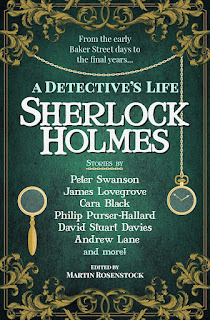 There's quite an industry involved in producing new Sherlock Holmes stories, some excellent, others less-so. I was recently somewhat disappointed by a Holmesian Christmas novel, but reflecting that I've always preferred Doyle's short stories to his full length Holmes cases, I gave this collection of 12 stories a go, and was generally impressed. The approach is to primarily cover the early days and last days of the Holmes-Watson duo, effectively filling in gaps, which works well.
There's quite an industry involved in producing new Sherlock Holmes stories, some excellent, others less-so. I was recently somewhat disappointed by a Holmesian Christmas novel, but reflecting that I've always preferred Doyle's short stories to his full length Holmes cases, I gave this collection of 12 stories a go, and was generally impressed. The approach is to primarily cover the early days and last days of the Holmes-Watson duo, effectively filling in gaps, which works well.Inevitably with each story written by a different writer there is some variation in the skill with which they match 'Dr Watson's' writing style in the originals - some get it spot on, others feel a little out of place. This is more notable in the early-set stories, as by the end we've reached the 1920s and it wouldn't be surprising if Watson had adopted a slightly more modern approach to his storytelling. I was surprised how much consistency there felt to be between the stories, apart from one that seemed to suggest Watson had gone through more wives than a Hollywood star.
It's difficult to pick out any individual outstanding stories - they rather merge, but in a pleasant way. Perhaps the oddest is Cavan Scott's The Wild Man of Olmolungring which, set it Tibet, is a very strange mix of the Edwardian style 'adventure in the wild' story with a Holmes-related twist verging on Scooby Doo. There was one story, The Elementary Problem by Philip Purser-Hallard where I was able to work out the solution to the puzzle Holmes was facing from the title alone - I'm not sure if that's a good or bad thing, but made me feel suitably smug. All-in-all, we got indirect connections to well-known Holmes canon events and characters in a way that was comfortable, familiar and enjoyable.
You can buy A Detective's Life from Amazon.co.uk, Amazon.com and Bookshop.org
Using these links earns us commission at no cost to youThese articles will always be free - but if you'd like to support my online work, consider buying a virtual coffee:Review by Brian Clegg - See all Brian's online articles or subscribe to a weekly email free hereJanuary 8, 2025
The Christmas Eve Murders - Noelle Albright ****
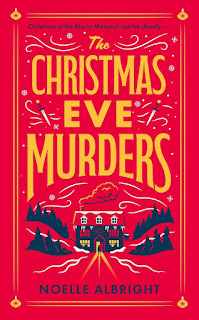 This is the last of my Christmas murder mystery reviews for this year (though there will be more crime). It's a very engaging, if distinctly implausible story.
This is the last of my Christmas murder mystery reviews for this year (though there will be more crime). It's a very engaging, if distinctly implausible story.The implausibility is a result of the contrived setting. Maddie, a Scottish journalist working in Manchester is heading home for Christmas, but when her car breaks down she gets stranded in a pub in the Yorkshire Dales in a heavy snowstorm. During an in-pub treasure hunt, one of those present gets murdered - in effect it's a classic country house murder mystery with a modified setting. What makes the situation more than a little contrived is that there happen to be a DI and his detective constable sidekick in the pub, so they can contact an investigation (with Maddie's help) while they're snowed in.
Once you get past this unlikely setup (plus one weak restriction of which more in a moment) though, Noelle Albright keeps the action going in good page-turning fashion. For the first few pages the writing tends to be a little over-descriptive - and the central character is surely in the wrong job as she is wary about almost everything - but once the action starts, Albright has a steady hand in building the tension and surprises. It helps that the pub has enough secret passages to keep every old house mystery lover happy.
To make the isolation work in our modern, connected world we had to have a location with no phone signal (perfectly realistically given it's the Yorkshire Dales) and that would have no landline or internet connection - this latter part was necessary, but provides that weak restriction as Albright simply has the killer cut the phone wire. We had this happen when I was at university and an over-enthusiastic audience member at a punk gig ran amok through the building cutting the phone lines for no obvious reason. It took about 10 minutes for me to fix our phone. If instead the author had made use of a smashed fibre broadband box it would have worked far better - but I admit this is a picky complaint.
The book is described as a 'hilarious and cosy festive murder mystery' - there was no obvious humour here apart from some tension-breaking jokes between characters, but there is certainly an element of cosiness and it gets full marks on both festivity and mystery. I surprised myself by enjoying it far more than expected, always wanting to read the next chapter.
You can buy The Christmas Eve Murders from Amazon.co.uk, Amazon.com and Bookshop.org
Using these links earns us commission at no cost to youThese articles will always be free - but if you'd like to support my online work, consider buying a virtual coffee:Review by Brian Clegg - See all Brian's online articles or subscribe to a weekly email free hereJanuary 7, 2025
So-called embarrassment quotes revisited
 REVISIT SERIES - An edited post from January 2015There is a usage that is becoming more and more common, verbally and in writing, which I hate. The most frequently used verbal form is 'so-called', and though it can also appear this way in writing, the usual written approach is what I call embarrassment quotes - misused quotation marks.
REVISIT SERIES - An edited post from January 2015There is a usage that is becoming more and more common, verbally and in writing, which I hate. The most frequently used verbal form is 'so-called', and though it can also appear this way in writing, the usual written approach is what I call embarrassment quotes - misused quotation marks.The reference that set me off on this bijou rantette was a comment on the Today programme on Radio 4, when they referred to 'so-called exoplanets'. Exoplanets exist. There is no doubt about this. Yet according to the OED, 'so-called' means 'called or designated by this name or term, but not properly entitled to it or correctly described by it'. In other words, by saying 'so-called' the speaker implies that there's no such thing.
Now, admittedly, the OED does qualify this definition by saying 'More recently, and now quite commonly (esp. in technical contexts), used merely to call attention to the description, without implication of incorrectness', but I am not prepared to accept this. It's stupid. If you simply mean that an object is an exoplanet, say 'exoplanet'. The 'so-called' is an unnecessary waste of space and confuses those of us who know what the term actually means.
Admittedly, NASA doesn't help with the way they label the picture I've used here which is attributed to 'NASA Hubble Space Telescope' - this genuinely makes it a so-called Hubble Space Telescope image, as it clear isn't a photo from Hubble (and the accompanying text says 'This is an artist's concept of the exoplanet WASP-121 b, also known as Tylos. Credits: Illustration - NASA, ESA, Quentin Changeat (ESA/STScI), Mahdi Zamani (ESA/Hubble).'
I've linked this phenomenon with embarrassment quotes, as these are used all the time by the press and by the BBC in a similar fashion. Whenever they use a word they're a little uncomfortable with, or that might not be correct, they stick it in quotation marks. A 10 second glimpse at the BBC News website gives us, for instance:
Second body found after sea 'dare'And
A&E waits in England 'getting worse'No doubt there were many more. You may suspect that the reason for the quotation marks in the second example was that the last two words were a quote from someone - but they weren't. In both cases, all we have are observations where, for some reason, a particular word or phrase makes a so-called journalist feel a little 'uncomfortable' so 'he or she' resorts to the embarrassment quotes.
Sad.
Image by NASA from Unsplash
These articles will always be free - but if you'd like to support my online work, consider buying a virtual coffee:
See all Brian's online articles or subscribe to a weekly email free hereJanuary 6, 2025
Murder under the Mistletoe - Richard Coles ****
 In previous books by Richard Coles, such as A Death in the Parish, it has been clear that the former pop star and current Anglican priest has a far better grasp of describing period village life and the church than he has of murder mysteries. That is even more obvious here: despite the title of this novella, murder hardly features - in fact the death occurs very near the end of the book.
In previous books by Richard Coles, such as A Death in the Parish, it has been clear that the former pop star and current Anglican priest has a far better grasp of describing period village life and the church than he has of murder mysteries. That is even more obvious here: despite the title of this novella, murder hardly features - in fact the death occurs very near the end of the book.Once again, Coles' observations of the niceties of 1980s village and church life are delightful - with the added special dusting that Christmas brings. Perhaps his finest creation is the central character Daniel Clement's mother Audrey, who personifies the period middle class's obsession with the delicacies of status and admiration of the upper classes. One of the stars of the book is Audrey's bread sauce, a turkey accompaniment that dates back to when English cooking embraced plainness, to the extent that the recipe is published at the back of the book.
Coles handles nicely the relationship of the vicar with his congregations, expanded significantly over Christmas time by the once-a-year brigade, something that happened even more in the 80s than is the case today. Somewhat bravely, he even includes a short but complete sermon. Admittedly, there were a couple of details that raised an eyebrow. Clement's churchwardens, sidespeople and other churchy supporting cast deserted him to clear up after the Midnight Mass alone (despite a 200-ish congregation - Coles it seems isn't a fan of accurate headcounts). And Clement and his friend were struggling to get fairy lights not to go through various flashing cycles - this feels unlikely in the 80s when white lights weren't LED and rarely flashed.
These books are pure atmosphere with a smidgen of plot attached - something that works particularly well in a Christmas title. Though not as good a mystery as A Death in the Parish, I very much enjoyed this one as a light seasonal snack.
You can buy Murder under the Mistletoe from Amazon.co.uk and Bookshop.org
Using these links earns us commission at no cost to youThese articles will always be free - but if you'd like to support my online work, consider buying a virtual coffee:Review by Brian Clegg - See all Brian's online articles or subscribe to a weekly email free hereJanuary 1, 2025
If Only They Didn't Speak English - Jon Sopel ***
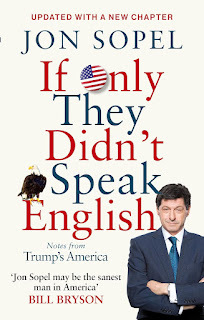 Teamed up with Emily Maitlis, John Sopel was for several years host of by far the best of the BBC political podcasts, Americast - most tend to be painfully worthy, including Americast post Sopel and Maitlis. The pair left to set up their own Newsagents podcast, but this has been uninspiring - it has only been since they've done a US spinoff that the pair have once again recaptured their magic.
Teamed up with Emily Maitlis, John Sopel was for several years host of by far the best of the BBC political podcasts, Americast - most tend to be painfully worthy, including Americast post Sopel and Maitlis. The pair left to set up their own Newsagents podcast, but this has been uninspiring - it has only been since they've done a US spinoff that the pair have once again recaptured their magic.One of there reasons I read this book from 2018 was my enjoyment of the engaging approach taken in the podcast - the other was the comment by Bill Bryson on the front, which made me think this would be like of one of Bryson's books - wry humour, underlining the differences between the US and the UK. In reality, If Only They Didn't Speak English is very different.
I'm glad I read it, but it was significantly harder going than I expected. Sopel's writing style has none of the verve of his podcasting persona - this is a serious book, examining a range of ways that American culture differs from British, whether it be attitudes to race, patriotism or guns. Although there are plenty of anecdotes from Sopel's time as BBC correspondent in the US, there is a surprising amount of historical material, some from the early days of the country and more from the first half of the twentieth century. Although the subtitle tells us these are 'notes from Trump's America' (the first time around), there's a lot about Obama's America too, as Sopel contrasts the then new and the previous president and their actions.
It's a shame Sopel didn't bring in more of his personal experience and cut back on the historical context a bit: the way the book is written feels like he was trying to make this more of a weighty tome than it really is. It would also have helped if the material had been broken up more - the 364 pages are split into ten chapters which have no subheadings or section breaks. This makes reading it quite heavy going. However, it was genuinely interesting to take in a view from the first year of Trump's first presidency as we are about to start his next one.
You can buy If Only They Didn't Speak English from Amazon.co.uk, Amazon.com and Bookshop.org
Using these links earns us commission at no cost to youThese articles will always be free - but if you'd like to support my online work, consider buying a virtual coffee:Review by Brian Clegg - See all Brian's online articles or subscribe to a weekly email free hereDecember 30, 2024
Death Comes at Christmas - Marie O'Reagan and Paul Kane (Eds.) ****
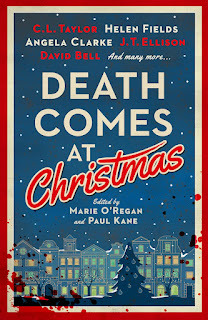 A full-blown murder mystery would overload a short story, but for some reason Christmas crime works well in short form, as witness the series of classic books that recently tailed off with
Murder by Candlelight
. It's refreshing to have a chunky new collection, some from high powered modern thriller writers - and the vast majority of the stories are well worth reading.
A full-blown murder mystery would overload a short story, but for some reason Christmas crime works well in short form, as witness the series of classic books that recently tailed off with
Murder by Candlelight
. It's refreshing to have a chunky new collection, some from high powered modern thriller writers - and the vast majority of the stories are well worth reading.I think it's fair to say that few come up to the really great classic Christmas mystery shorts, but I very much enjoyed, for example, C. L. Taylor's How to Commit Murder in a Bookshop - I think many published authors would quietly identify with the targeting of agents, publicists, marketing people and the like (leaving readers and booksellers safe). Russ Thomas gives us a dark old Christmas house scare with The Red Angel, and there's amusing murderous fluffiness in The Wrong Party. Some good twists too - for example in Samantha Hayes' dark Frostbite, while Sarah Hilary's Marley's Ghost gives us a very satisfying ending in true Christmas Carol style.
There's only one story that was an out and out turkey. Alexandra Benedict revived her unlikeable characters from last year's Christmas Jigsaw Murders. The story's one redeeming grace is its very clever title - The Midnight Mass Murderer. However, the mass murder in question - the killing of a whole midnight church congregation - wouldn't work. The murderer's threat (to kill 'just under two hundred people') is far too accurate a prediction as no one can accurately predict a congregation size, but more importantly the method (carbon monoxide poisoning) is far too slow and variable in impact to take out a whole group of people in one go with no survivors. Most hilariously inept, though, is Benedict's attempt to take out our amateur detectives. Again carbon monoxide is the mechanism - but quite how this was emitted by 'storage heaters' - which are electric - is not made clear.
It's perhaps too much to expect every story in a collection to be a good one (though I'm not sure what the editors were playing at including that one) - but you still get 17 satisfying reads, which is an impressive success rate.
You can buy Death Comes at Christmas from Amazon.co.uk, Amazon.com and Bookshop.org
Using these links earns us commission at no cost to youThese articles will always be free - but if you'd like to support my online work, consider buying a virtual coffee:Review by Brian Clegg - See all Brian's online articles or subscribe to a weekly email free hereDecember 28, 2024
Murder at Holly House - Denzil Meyrick ***
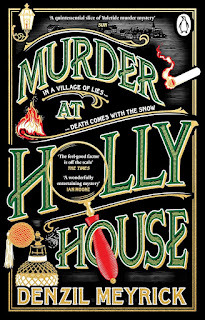 In a mystery, things are often not what they seem - but usually a book cover is a fair indication of what a book is. In this case it isn't. You'd think this was a cosy Christmas murder mystery. No, it's not. You would think it would centre on a murder at Holly House. It doesn't. Admittedly there is a murder in the said building, but it's a marginal part of the plot as a whole. Of itself, this isn't necessarily bad, but there were other elements that put me off too.
In a mystery, things are often not what they seem - but usually a book cover is a fair indication of what a book is. In this case it isn't. You'd think this was a cosy Christmas murder mystery. No, it's not. You would think it would centre on a murder at Holly House. It doesn't. Admittedly there is a murder in the said building, but it's a marginal part of the plot as a whole. Of itself, this isn't necessarily bad, but there were other elements that put me off too.The book is supposedly the memoir of a failure of a detective inspector, sent in the early 1950s to a village on the North Yorkshire moors as punishment for a misdemeanour. The village, Elderby, itself is decidedly reminiscent of the village setting of the old TV show Heartbeat, but somehow this village supports a police station with an inspector, a sergeant and a couple of constables. Inspector Grasby is faced with an increasingly complex situation as death follow death, aided or hindered by a female American intern at the already overcrowded police station, a narcoleptic sergeant, a landlady out of a gothic fantasy with a raven as a pet, and a clergyman father who seems to detest our hero.
It would give away too much to say how the plot develops, but it is definitely not in the cosy murder mystery vein. There are certainly some interesting developments, but I was never gripped by it. This in part was because of the nature of the main character - Grasby is weak and self-serving, only becoming a hero by accident. His first person narration sounds more like that of a lesser P. G. Wodehouse character than a 1950s detective. The humour is heavy-handed. And, to add to the detachment from engagement, a lot of the characters have silly names, such as Superintendent Juggers, Lord Mitch Parsley, Mrs Gaunt, Lord Damnish and Sergeant Elphinstone Bleakley.
The cover tells us that the feel good factor is off the scale and it's a wonderfully entertaining mystery. I'm amazed they thought this if they were reading the same book. It was okay. I didn't give up on it. But it was the worst Christmas mystery novel I've read in quite a while.
You can buy Murder at Holly House from Amazon.co.uk, Amazon.com and Bookshop.org
Using these links earns us commission at no cost to youThese articles will always be free - but if you'd like to support my online work, consider buying a virtual coffee:Review by Brian Clegg - See all Brian's online articles or subscribe to a weekly email free hereDecember 19, 2024
Ho, ho, ho!
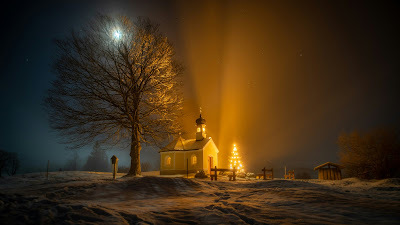 It's that time when sensible people take a break from the internet. There won't be any blog posts next week, but I'll be back soon. Meanwhile, there's a great carol below...
It's that time when sensible people take a break from the internet. There won't be any blog posts next week, but I'll be back soon. Meanwhile, there's a great carol below...For those of us who celebrate Christmas, have a great one - and an excellent 2025 to all.
Having sung in choirs pretty much all my life, I'm a huge fan of good church music. Here's one of my favourite carols, Arthur Oldham's setting of Remember O Thou Man, which I first discovered when singing at the Oxford Physics Department carol service (don't ask) - it's not very well known, but well worth a listen.
If you like a bit of musical history (source The New Oxford Book of Carols), the words date back to the early seventeenth century, appearing as 'A Christmas Carroll' in Thomas Ravenscroft's 1611 Melismata: musical phansies fitting to court, citie and country humours to 3, 4 and 5 voyces. It's not known if the tune Ravenscroft used was original or a traditional one. It also has a small starring role in Thomas Hardy's Under the Greenwood Tree, when the choir has trouble singing it. As one character says 'The first line is well enough, but when you come to "O, thou man," you make a mess of it.' Oldham's setting bears no resemblance to Ravenscroft's and is far more challenging to sing, but haunting:
Image by Andreas Kretschmer from Unsplash
These articles will always be free - but if you'd like to support my online work, consider buying a virtual coffee:
See all Brian's online articles or subscribe to a weekly email free hereConnected green thinking
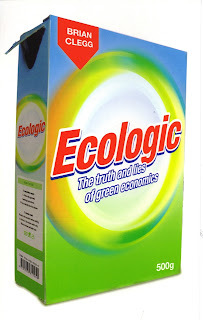 The problem with much of our approach to the environment is that it's driven by fuzzy feelings, rather than logic and connected thinking. This has come up recently in respect to missing links in the renewable energy grid, but can also be seen in our approach to electric vehicles, the knee-jerk environmental reaction to nuclear, the way environmentalists embrace organic food and much more.
The problem with much of our approach to the environment is that it's driven by fuzzy feelings, rather than logic and connected thinking. This has come up recently in respect to missing links in the renewable energy grid, but can also be seen in our approach to electric vehicles, the knee-jerk environmental reaction to nuclear, the way environmentalists embrace organic food and much more.Way back, I wrote a book called Ecologic to try to address this lack of clear thinking. It won a prize, but didn't have much impact other than getting me labelled a 'green heretic', which I have accepted as a badge of honour. Sadly, though, bringing logic to green issues continues to be a problem.
The example that brought this to mind was the news that the massive Scottish Seagreen offshore wind plant has only been able to provide one third of its potential capacity this year - it sold 1.2 million gWh to the grid, where it could have provided 3.7 gWh. The reason for the disparity is that the the connectors carrying energy to England can only handle 6.3gW - nowhere near enough. And even with new connectors planned by 2030, there will still be far more produced than Scotland and the connectors can make use of - literally a lack of connected thinking.
I ought also to briefly revisit organic food: I recently saw a questionnaire designed to measure your environmental effectiveness. It asked if you encouraged people to use food at home that is LOAF (Locally grown, Organic, Animal-friendly, Fairtrade). Locally grown is good environmentally (as long as it's not, say, tomatoes in hot houses). Animal-friendly and Fairtrade are both ethically positive, but don't necessarily have an environmental benefit. But organic methods are simply not an environmentally sustainable replacement for conventional farming on large scale - organics are emotional-sell products, primarily used as a marketing tool.
It's time we focused on results, rather than feel-good in the move to be green.
This has been a Green Heretic production. See all my Green Heretic articles here.
Image by Eduardo Aparicio from Wikipedia
These articles will always be free - but if you'd like to support my online work, consider buying a virtual coffee:
See all Brian's online articles or subscribe to a weekly email free here


